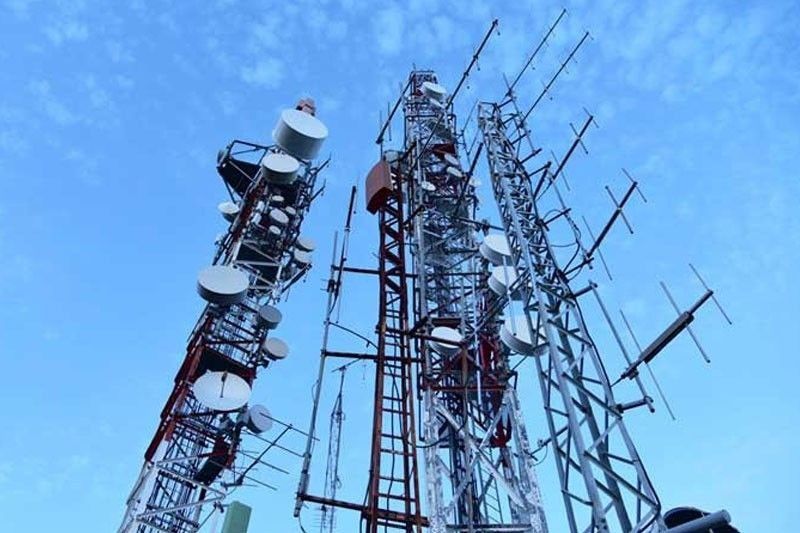Telcos told: Shape up, take warning seriously

MANILA, Philippines — The country’s telecommunications companies should take President Durterte’s threat of “expropriation” seriously and “shape up,” Senate President Vicente Sotto III said yesterday.
“It’s about time they shape up, and not just think of incomes,” Sotto told reporters via videoconference even as he warned the government has other means to ensure compliance other than expropriation.
He said Congress can swiftly revoke their franchise and “have other investors take over.”
He said the Philippines embarrassingly lags far behind its neighbors in terms of information and communications technology (ICT) infrastructure.
The President, in his fifth State of the Nation Address on Monday, lashed out at Globe Telecom and Smart Communications for their supposed poor service.
Sen. Grace Poe, who chairs the Senate committee on public services which also approves franchises, warned the “frustration is growing by the day for fast, affordable and reliable internet service, which has become a necessity as people rely more on digital technologies amid the pandemic.”
“We know that improving internet service and coverage will happen not only by obligating the telcos but government regulators as well to remove the roadblocks to building the necessary communication infrastructure,” Poe said.
She said concerned national agencies and local government units should step up so that the approval of at least 25 regulatory permits for the construction of cell towers would not take six months or more.
She also renewed her call for the passage of the proposed E-Government Act to make government services accessible online.
The measure seeks to establish real-time service and streamline business registration with government agencies, while ensuring transparency of dealings.
“To fully implement this when passed, internet connection is crucial. Both government and telcos should work double time to give our millions of Filipinos better and cheaper connectivity by the end of the year. We expect them to act with urgency and sense of duty for the sake of our people,” she said.
Sen. Panfilo Lacson noted such threats from Duterte worked in the past, citing Mighty’s P40-billion tax settlement, Philippine Airlines’ settling a P6-billion obligation to the government, the Mile Long property taken over by government and the rehabilitation of Boracay.
“Whether the government takeover of telcos is justified and compliant with the provisions of the Constitution, given the circumstances, is another matter altogether, however,” Lacson said.
“Having said that, telcos should treat the President’s pronouncement as a wake-up call to improve their services to the public, as one thing in the President’s statement on the issue is certain and true: that our country’s telecommunications services pale in comparison with our neighbors and with other jurisdictions in terms of speed and efficiency,” he said.
Lacson, however, said Duterte failed to issue a similar warning to some local executives who extort money from telcos in exchange for permits and licenses as well as “protection” from delays in the construction of such facilities, especially in areas where the presence of armed groups like the CPP-NPA is strong.
At a press briefing, presidential spokesman Harry Roque Jr. said President Duterte’s warning may have stemmed from his own experience of poor service from two of the country’s biggest telecommunications firms.
“His priorities are not only telcos. Everything that can benefit the people is his priority,” Roque said.
“We know how important communication is nowadays, even the internet is now human rights. So what the President wants is for telcos to improve their service. They’re earning after all,” he said.
Roque did not clearly answer if Duterte’s directive would also cover Dito Communications, which is one of the firms of Davao-based businessman and ally Dennis Uy.
Roque said the National Telecommunications Commission (NTC) has its own set of standards for the telecoms industry.
Just like the President, Roque also cited his own bad experience in the use of voice over internet.
Sharing concern
Meanwhile, the Dito Telecommunity of Uy and state-owned China Telecom said it shares President Duterte’s concern regarding connectivity, as it looks to accelerate the launch of its network commercially within the first quarter of next year.
“We cannot speak for what the President has mentioned in his State of the Nation Address. As far as Dito Telecommunity is concerned, we all share the concern of the President for the need to provide world class connectivity to the Filipino people, especially in the face of the pandemic,” Dito chief administrative officer Adel Tamano said in a statement yesterday.
Tamano reiterated that Dito is on track to meet the commercial rollout target slated for March 2021.
“Furthermore, Dito is currently working on meeting the 27 mbps and 37-percent coverage in time for the government technical audit come January of 2021,” he said.
The technical audit of Dito’s network was originally scheduled last July 8, but the NTC has given the company a six-month extension, or up to Jan. 7 next year, to deliver its commitments in consideration of the COVID-19 crisis.
“As Dito Telecommunity hastens its roll-out in time for March 2021, let me assure the Filipino people that we recognize the clamor for the third major telco to already go on-air. Dito is doing all it can to work through the challenges, move forward and launch soonest,” Tamano said.
PLDT on Monday did not issue a comment on the President’s statements, while Globe said it would heed the call of Duterte to improve telco services.
In a stock exchange filing yesterday, publicly-listed Dito CME Holdings Corp. said its board re-approved the increase of the company’s authorized capital stock from P2.8 billion divided into 2.8 billion common shares at P1 per share to P40 billion divided into 40 billion common shares at P1 per share.
Dito CME said details of the increase in authorized capital stock as regards the subscriber of the shares are not yet finalized.
The firm’s board also approved the change of the corporation‘s corporate term from 50 years to perpetuity. — Richmond Mercurio, Christina Mendez
- Latest
- Trending






























